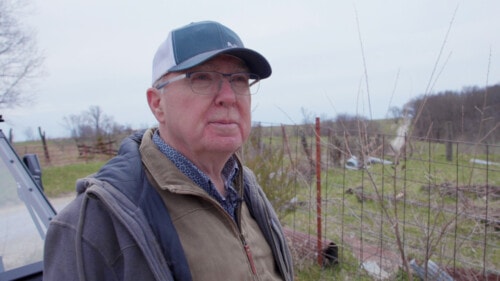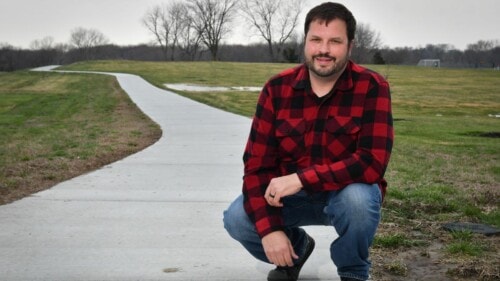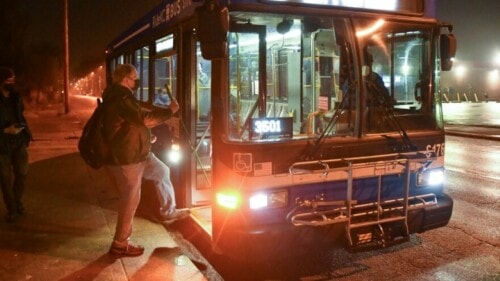If More Kansas Citians Rode the Bus by Choice, it Could Shift the Whole City’s Mindset Despite long wait times between buses, confusing route changes and other inconveniences, these Kansas Citians use public transit not because they have to, but because they want to. Here's why that matters.
Published May 3rd, 2022 at 6:00 AM
Above image credit: Sofia Gillespie likes to take the bus when meeting up with friends. (Contributed)Stephen Juza is about to buy a car.
For the last few years, he’s taken the 519 from downtown — where he lives — to the Garmin headquarters in Olathe, where he works. He gets on the bus near Crown Center and doesn’t have to get back off until reaching 151st Street. He basically lands at the doorstep of his office. So, it’s a long bus ride, but not an inconvenient one. And Juza prefers it to driving.
“I don’t wanna make that drive. I would much rather just take the bus and kind of zone out,” he says. “But they’re stopping that route after next week.”
The 519, Juza explains, will soon end at 135th Street.
It’s been a good run, though. When Juza first moved to Kansas City, he lived and worked downtown, with a 10-minute commute by foot. And it didn’t take long for him to conclude that catching an Uber when he needed to go someplace inaccessible by transit would cost less than the monthly expense of owning a car. So he ditched his car.
Juza is a bus rider by choice. That’s a privilege, and it’s not the case for the vast majority of people using public transit in Kansas City. But when I picture a transit system that works, I picture a transit system everyone uses — at least some of the time — because why wouldn’t they?
Kansas City is home to plenty of people I’ll call aspirational transit users. That is, people who like the idea of public transit, but either haven’t tried it here, or have looked into it but concluded that it’s just too impractical for regular use — especially given another choice.
But people do get around Kansas City by bus every day. It is possible.
As the metro wrestles with what can be done to reverse course on climate change, reliance on personal automobiles looms large as an obstacle to change. On the whole, we just need to drive less. Which means more people probably need to get familiar with transit.
And then, he changed jobs.
Making Juza a bit of a case study.
He’s stuck with it for almost 10 years. But even as someone who prefers riding the bus, someone willing to take on the mental load of painstakingly mapping out his days according to bus schedules, Juza has reached the point where a rider-by-choice will take an out, if he has one.
The problem is that most people who use the 519 to Olathe ride between downtown and 135th Street, but the leg that runs south of 135th Street takes up a whole a lot of time, making it hard to justify that final stretch. Long wait times between buses are a pain point for transit users, and shortening this route does seem like a reasonable way to better serve the majority of riders.
But that logic doesn’t get Stephen Juza to work.

When I share Juza’s story with Fourth District City Councilman Eric Bunch, a longtime advocate for transit users and a bus-rider-by-choice himself, he seems pleased until the kicker. One route gets shortened and it’s game over. Bunch shakes his head in disappointment.
“There are really two issues in that,” Bunch explains. “One is, funding. And resource scarcity.”
Ideally, Ride KC has enough drivers to keep up frequency without cutting routes. That’s simply not the current reality.
But the other issue is: sprawl.
“There has to be a conversation about how transit access relates to land use decisions,” Bunch says. “Jobs have been largely decentralized and moved to places that are incredibly car-dependent neighborhoods and car-dependent parts of the metro.”
That’s not a coincidence, he says.
“Look at places like Cerner,” Bunch says, referring to a watershed moment in Kansas City development. In 2013, the City Council approved huge incentives for the corporation’s new campus at Interstate 435 and Bannister Road. Cerner got $1.63 billion in tax breaks from the city and state combined.
“We decided to give them the largest TIF in history and literally incentivize them to move to a place that is completely inaccessible by anything other than a car,” Bunch says.
It’s not impossible to use transit to get to Cerner, but the closest bus stop to Cerner is a 15-minute walk away, and not in a particularly walkable part of town.

The challenges, in other words, are bigger than what the individual bus rider can overcome through sheer force of will.
Bus-riders-by-choice have a few things in common. Most notably: living in a high density part of town well served by buses; working in a place that fits the same description; and having some conviction behind their choices.
David Katz lives just north of the Missouri River with his wife and the three of his four children still living at home — ages 15, 11 and 9. The family hasn’t had a car in 15 years.
They opt to ride the bus to save money, for environmental reasons, for the health benefits of being forced to walk to and from bus stops. Katz also has perhaps a slightly quirky motivation.
“I’m really not a very mechanically oriented person and I hate owning things that I don’t understand,” Katz says.
Katz says it hasn’t been a problem for the kids to get around.
“A lot of parents worry about their kids getting a drivers license,” he says. “Things can happen on the bus, too, but I don’t have to worry about them doing something stupid behind the wheel. So it gives me peace of mind, and it gives them, the older kids, mobility. I don’t have to drive them to soccer practice. They can get places on their own.”
Katz says that his kids built up to riding alone, and that they’re able to go where they need to go by about 13 years old. The kids may like it, but the sight of children on public transit unaccompanied gets a reaction in Kansas City.
“I have gotten, you know, a phone call from the police saying, ‘Hey, we, we ran into your kid on public transit,’ ” Katz admits.

Sofia Gillespie is in her 20s. She initially moved downtown to be close to her first post-collegiate job, and although she has a car now — which she uses sparingly — she hadn’t yet saved up for one at the time.
“So I looked up, you know, how the buses work,” she says. And her first discovery was a happy one: the buses are free!
“I didn’t believe it at first. I was like, ‘No, there has to be some sort of pass.’ And every time I try to take a friend on the bus, they’re like, ‘Are you sure we don’t need anything?’ And I’m like, ‘No, you just ride the bus!’ “
She especially likes the bus for going out with friends in busy parts of town. She doesn’t have to think about parking. She doesn’t have to deal with traffic.
Gillespie admits it’s nice to have a car now, for things like grocery shopping. And it also gives her flexibility she wouldn’t otherwise have. “If I don’t have time,” she says, “I don’t take the bus.”
Every bus-rider-by-choice acknowledged the privilege of having a choice at all. Every one of them also said that when they’ve been stranded at bus stops, they’ve been sitting next to people for whom this isn’t a choice. They’ve all made the point that the bus first and foremost needs to work for the bus riders who can’t just call an Uber in moments of desperation.
Kecia Smith, now in her 40s, grew up riding the bus in Kansas City.
“I lived with my grandmother in middle school and high school and she was a bus rider. And so it actually was very natural for me to ride the bus,” she says.
Smith does drive a car now, but she still hops on the bus from time to time.
And she worries that talking about people who ride the bus by choice will push us further from focusing on better access for those who absolutely rely on transit. “We need to ensure that the experience they receive is five stars,” she says.
But that’s actually another reason people who can opt out should opt in from time to time instead.
Eric Bunch says that people who drive are very vocal about getting streets they drive on plowed, about getting potholes fixed. But the problems we don’t see, we can’t advocate to change.
I’m not saying don’t drive. I’m saying just hop on a bus once in a while. Because money isn’t the only resource that’s scarce; so is political will. And the bus could use a lot more of it.
Gina Kaufmann is a columnist and podcaster with KCUR 89.3, a member of the KC Media Collective.








